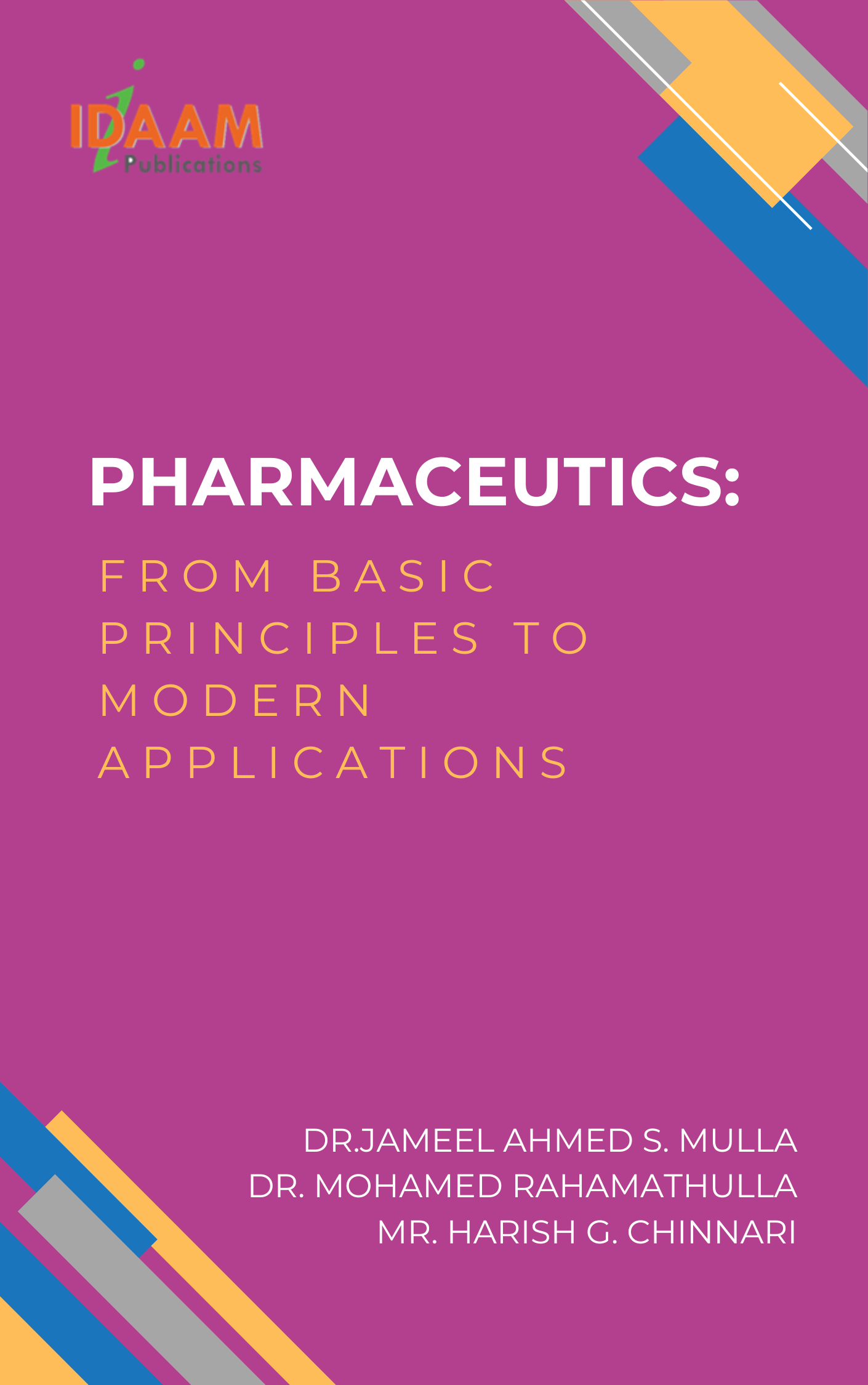
Pharmaceutics: From Basic Principles to Modern Applications
(The book will be published with an ISBN)
Submit chapter abstract (250-300 words) along with table of content to books.idaampublications@gmail.com
About The Book:
Pharmaceutics: From Basic Principles to Modern Applications offers a concise yet comprehensive overview of drug formulation and delivery, bridging fundamental concepts with cutting-edge technologies. Covering topics from solubility and dosage forms to nanotechnology and personalized medicine, this volume highlights the evolving role of pharmaceutics in modern drug development. A valuable resource for students, researchers, and professionals in pharmaceutical sciences.
Tentative Table of Contents:
Part I: Foundations of Formulation and Design
Chapter 1:Foundations of Pharmaceutics(Scope, history, and role in pharmaceutical sciences).
- Chapter 2: Physicochemical Principles in Drug Formulation
(Solubility, pKa, partition coefficient, ionization, etc.).
Chapter 3:Dosage Form Design: An Overview(Classification, route of administration, and design criteria).
- Chapter 4: Biopharmaceutics and Pharmacokinetics Basics
(ADME, bioavailability, and absorption mechanisms).
- Chapter 5: Drug Stability and Degradation Kinetics
(Shelf-life, degradation pathways, and stabilization strategies).
Part II: Conventional Dosage Forms
- Chapter 6: Solid Dosage Forms
(Tablets, capsules, powders – formulation, manufacture, evaluation).
- Chapter 7: Liquid Dosage Forms
(Solutions, suspensions, emulsions – preparation and stability).
- Chapter 8: Semisolid and Topical Dosage Forms
(Creams, ointments, gels – skin permeation and formulation issues).
- Chapter 9: Parenteral Preparations
(Sterility, pyrogen testing, isotonicity, and large/small volume parenterals).
- Chapter 10: Suppositories and Novel Rectal/Vaginal Dosage Forms
(Base selection, formulation, and drug release).
Part III: Advanced Drug Delivery Systems
- Chapter 11: Controlled and Sustained Release Systems
(Matrix systems, reservoir systems, and release kinetics).
Chapter 12:Targeted Drug Delivery and Site-Specific Systems(Ligand-based, stimuli-responsive systems).
- Chapter 13:Transdermal Drug Delivery Systems (TDDS)
(Mechanisms of skin permeation, patches, enhancers).
- Chapter 14: Mucosal and Pulmonary Drug Delivery
(Nasal, buccal, pulmonary delivery strategies and devices).
- Chapter 15: Ocular and Intranasal Delivery
(Formulation strategies, permeability barriers).
Part IV: Modern Applications and Technologies
- Chapter 16: Nanotechnology in Drug Delivery
(Nanoparticles, liposomes, dendrimers, nanoemulsions).
Chapter 17:3D Printing in Pharmaceutics(Print-based formulation approaches, regulatory considerations).
- Chapter 18: Pharmacogenetics and Personalized Formulations
(Custom dosing, patient-centric design).
- Chapter 19: Peptides, Proteins, and Biopharmaceuticals
(Delivery challenges and formulation techniques).
- Chapter 20: Artificial Intelligence and Machine Learning in Pharmaceutics
(Data-driven formulation optimization, predictive modeling).
Part V: Industrial and Regulatory Considerations
- Chapter 21: Preformulation and Formulation Development
(Analytical methods, excipient selection).
- Chapter 22: Quality by Design (QbD) and Risk Assessment
(Design space, control strategies, PAT tools).
- Chapter 23: GMP and Regulatory Guidelines
(FDA, EMA, ICH – relevance to formulation development).
- Chapter 24: Scale-Up and Technology Transfer
(Pilot to commercial batch considerations).
- Chapter 25: Future Trends in Pharmaceutics
(Smart delivery, gene therapy vehicles, regulatory innovation).
[Note: Strikethrough chapters (1, 3, 12, 17) are already been taken by other authors].
About Editors:

Dr. Jameel Ahmed S. Mulla
Professor & Head,
Department of Pharmaceutics,
Shree Santkrupa College of Pharmacy, Ghogaon-Karad, MS, India

Dr. Mohamed Rahamathulla
Assistant Professor, Department of Pharmaceutics, College of Pharmacy, King Khalid University Alfaraa, Abha 62223. Kingdom of Saudi Arabia

Mr. Harish G Chinnari
Senior Director,
Formulation R&D,
Azurity Pharmaceuticals
Important Dates:
• Abstract Submission: by 10ᵗʰ November 2025
• Abstract Acceptance: by 15ᵗʰ November 2025
• Full Chapter Submission: by 31ˢᵗ December 2025
• Full Chapter Acceptance: by 15ᵗʰ January 2026
Chapter Processing Charge (CPC):
A Chapter Processing Charge (CPC) is required to cover the costs of typesetting, processing, and global online hosting. All corresponding authors will be asked to pay their publication charges upon acceptance of abstract as Chapter Processing Charge –
USD 100 (for overseas authors), INR 3000 (for authors from India) per published chapter (Maximum 3 Authors per Chapter).






























